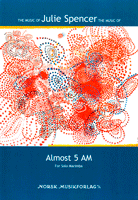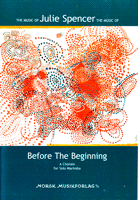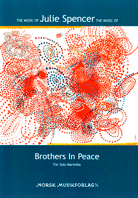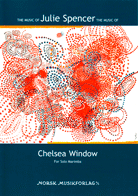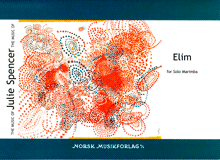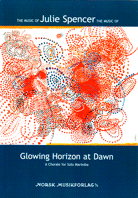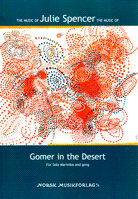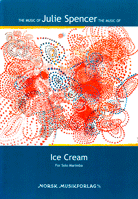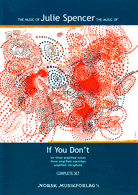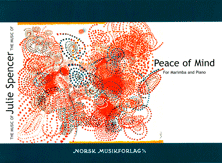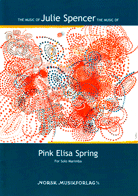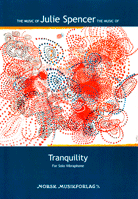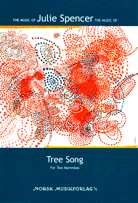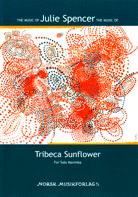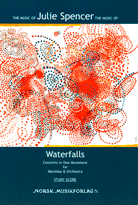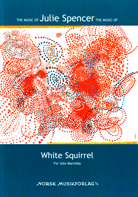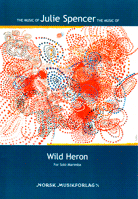Compositions
Solo Marimba
Almost 5 AM
By: Julie Spencer
This piece is written for 2 mallets. It requires a performance method that I developed as a student at the Eastman School of Music, the Relaxed Concentration Technique. When applied to two mallet keyboard playing, the technique shifts the focus of attention onto the large muscle groups of the arm instead of the small muscle groups of the hands and fingers.
In the summer of 1987 I heard a chorus of birds singing in Paris outside the window of the apartment at almost 5 am. It was an experience of simplicity and beauty, which inspired this music.
Solo Vibraphone
ASK
By: Julie Spencer
Ask was written in the summer of 1991, in a large room, called A 300, at the California Institute of the Arts. It became the title track for the first cd, the following year, because the simple act of asking questions, listening and watching to see things more deeply, and to hear with the soul, is what the whole creative life is about – asking, without expectation, – asking, without assuming to know already, – asking because it is in our nature to desire – and if we simply direct that desire to asking what is most essential, then we can use all of who we are for what is the greatest good – and that always has something to do with simply being who we are, unique, and complete, without asking for anything else, reflecting an implicit desire to be, and to experience that being with fullness and peace. Ask reminds me to look at myself, and what I desire, and to think about what is most important.
The final melodic phrase of the piece is an echo of that question. The chordal statements of dissonance and harmony throughout the piece express the tension between desire, assumptions, expectations, and letting go. Ask is about letting go, instead of trying to hold onto something – because letting go of what you think you see is the only way to see anything new.
Solo Vibraphone
Before the Beginning
By: Julie Spencer
Before the Beginning was written during a time of new beginnings. I had just begun studying tabla, West African drumming, jazz harmony, and improvisation at CalArts in Los Angeles. I went back to the marimba one day to write this piece for a student’s recital. It was cathartic. The peaceful intensity of Before the Beginning made me think about keeping a calm center in the middle of so much change. Shortly afterwards I recorded Before the Beginning for the first time in the studio of the late French film composer Michel Colombier. This was one of his favorite pieces of mine.
There is also a version for Marimba Quartet.
Solo Marimba
Brothers in Peace
By: Julie Spencer
Brothers in Peace was written for Martin Luther King, Jr., and Mahatma Gandhi.
From two religious backgrounds, serving the same goal, till the end of their lives, they worked tirelessly in making social, political, economic, and personal freedom possible for all individuals of their respective societies. King, a Christian minister, profoundly inspired by Gandhi’s efforts, strove to forgive, and enlighten bigoted white America, and to embolden the communities of disenfranchised African Americans to claim their rights as fellow citizens of democracy. Gandhi, an attorney, who exchanged his business suit for a simple cloth wrap, worked to free the Indian subcontinent from British colonial rule, and to encourage the oppressed under the class system of Indian society to exercise their voice for equality and justice. Both were assassinated by gunfire.
My inspiration for the piece comes from their bravery, their humility, their spiritual core from which all strength flowed into one purpose – to make a better world for the people around them, and to give a voice to people who had no voice, and power to the powerless, and to forgive and not to fight with violence, but with words, and will, and faith. The piece ends with echoes of the gunshots that ended their lives, but did not end their vision. Brothers in Peace was written for and premiered by Nancy Zeltsman.
Solo Marimba
Chelsea Window
By: Julie Spencer
Chelsea Window was written following a stay in New York City’s Chelsea Hotel, which has a long and interesting history. Standing at the window, I noticed the silence, so many floors above the car filled streets, looking out at the rooftops, glimmering in the sun of the late afternoon, – so many people around, and yet so quiet. The lobby, full of faces and languages in the mirrors, next to the front doors, in the broad stairway, a global cross section. It was a surreal experience, of old, calm, regality, in the dark paneling and architecture, and the intercultural ethnicity and urbanization, of the present day Chelsea. The music reflects the dichotomy of this experience, with the juxtapositions of suspended resolutions in jazz harmonies and Latin rhythms.
Solo Marimba
Elim
By: Julie Spencer
When Emilo Radocchia, the studio percussionist, jazz vibist and composer known professionally as Emil Richards, showed me his newly designed mallets, he explained that the slap mallet idea had been used for jazz vibes years ago, and that the rattle mallet gave back a world music sound to the western marimba. He took the mallets and improvised for a moment on the marimba there in his studio, with his usual odd meter, bitonal, fiery flare, saying that he wanted a piece with this kind of feel to it, jazz and world music together. I went home and immediately wrote the beginning theme for “Elim.” Premiered for solo marimba at the Percussive Arts Society International Convention in Atlanta, Georgia, 1994, “Elim” also has a forthcoming version for marimba concerto with orchestra. It was meaningful to have this opportunity to give something back through the music to a friend and mentor who has shared so much of his inspiring creativity with me. The title, an anagram of Emil’s name, is also a location in the Biblical story of Moses, where the people found an oasis in the middle of the desert. There is so much in life to be grateful for.
Solo Marimba
Glowing Horizon at Dawn
By: Julie Spencer
“Glowing Horizon at Dawn” is the story of waiting in darkness while seeing the vision of a sunrise in the mind’s eye, trusting in the presence of and the eventuality of metaphoric goodness. The entire piece takes place before sunrise. The conclusion anticipates the joy of the light, while trusting that it is already here. A strong filmic reference for me is the recurring theme of angels on the earth pausing for sunrise, in director/writer Wim Wenders’ “Der Himmel Über Berlin.” It is a peaceful image of humility and love.
Solo Marimba
Gomer in the Desert
By: Julie Spencer
„Gomer in the Desert“ was written in front of a large glass window, on a couple of sunny days, with light streaming across the marimba bars, in the desert of southern California. I always hear a full orchestra arrangement in the lush chords.The title comes from the Bible, in the book written about the prophet Hosea and his wife Gomer, who is a metaphorical figure for the people who follow God. In the story God hoped the people would become more grateful for all the good things given to them in their lives. Gomer must first go into the desert to free her mind, in order to learn to see the beauty of God’s love through simplicity. The story is a reminder to find more happiness in less things. The bowed gong represents the impression of God’s voice in the desert, calling to us to see the miracles all around us.
Solo Marimba
Ice Cream
By: Julie Spencer
Ice Cream” is a metaphor for what is wonderful about being a child, the thrill of effortless concentration – experiencing the laughter and tasting the joy of profoundly simple moments filled with the beauty of timeless freedom.
Voice, Marimba, Vibraphone
If You Don’t
By: Julie Spencer
If You Don’t is a kind of postmodern medieval chant. Pure vocal tones improvised in sporadic chordal formations swell above the tapestry of water-like sounds that float out of the marimbas, with the special sound effect of rolling handfuls of sticks back and forth across the wood. Distant melancholic interjections from the vibraphone create an illusion of expanding space and time. The piece exudes an atmosphere of intense spiritual longing and reconciliation.
The title is taken from a quote by a friend, who, moved by the sound of my voice, said, “If you don’t stop singing, I’ll cry.” The metaphor of the title refers to the irony of self expression. If we resist allowing ourselves to be moved as receivers, we lose something of the creative ability as givers. The piece was written in 1988, premiered at the California Institute of the Arts in 1989, and is recorded on the Julie Spencer and Gernot Blume CD “Lost & Found.”
Marimba and Piano
Peace of Mind
By: Julie Spencer
Premiered in Tokyo for the Japan Percussion Society Festival 2004, Peace of Mind for marimba and piano is a sound collage of layered transparencies. Alternating cascading linear constructions with odd meter rhythmic grooves in rapid transformations, the interwoven textures evaporate and build again, juxtaposing a double time feel of expressive determination with a half time feel of inner reflection.
Dedicated to my father, who passed away in 1993, the piece is a reminder that to remain open to experiences of deep sadness is part of the process of discovering peace of mind.
Solo Marimba
Pink Elisa Spring
By: Julie Spencer
Pink Elisa Spring was inspired by an evening together with friends in Los Angeles who were visiting my music space. The little five year old girl of the family danced lightly through the large room, between all the instruments, and found a rose colored plastic spotlight gel lying on the floor. She held it up in front of her face, and looked into the ceiling lights and smiled with delight, as the world turned pink! After this lovely moment, the piece I was working on at the time, still untitled, took the name of the little girl, Elisa. It was a beautiful evening in the spring of 1989.
The title is taken from a quote by a friend, who, moved by the sound of my voice, said, “If you don’t stop singing, I’ll cry.” The metaphor of the title refers to the irony of self expression. If we resist allowing ourselves to be moved as receivers, we lose something of the creative ability as givers. The piece was written in 1988, premiered at the California Institute of the Arts in 1989, and is recorded on the Julie Spencer and Gernot Blume CD “Lost & Found.”
Solo Marimba
Tranquility
By: Julie Spencer
Tranquility is a word that I learned as a child from the first lunar expeditions, from Tranquility Base. It has a wondrous transcendent quality, this word that creates an audible spiritual experience of inner calm, like the quietude of the surface of the moon. This spaciousness is aptly portrayed by the tender liquid sounds of the vibraphone.
Two Marimbas
Tree Song
By: Julie Spencer
„Tree Song for Two Marimbas” has influences of jazz harmony and African 12/8 rhythms. The marimbas echo bird calls in the forest at different times of day as the trees respond to changing winds and rain. The phrases of communication, conflict, and resolution they create together are a reflection of our world in constant change, as we search for peace within ourselves, between our societies, and with our environment.
Written as a variation on themes from an earlier flute and marimba duet piece commissioned by Vicki P. Jenks, „Tree Song for Two Marimbas” is dedicated to Gordon Stout.
There is also a version for Marimba and Piano.
.
Solo Marimba/ Marimba Quartet & Percussion
Tribeca Sunflower
By: Julie Spencer
One afternoon in Tribeca, a small neighborhood in New York City which has bright yellow sunflowers planted in the summer in front of a silvery tall sunflower sculpture, sitting in the cafe across the square, I thought about the differences between the beautiful living art and the artist’s rendition of nature’s sculpture.
I was moved to play music when I got home, with the images in my mind, and the ideas developing musically, of different sorts of existence, side by side, reflecting one another peacefully, both alive, but in completely different ways. It became for me a metaphor of people living together, seeking new and positive experiences with cultures that are on the surface dissimilar, but are in fact alive together, side by side on the earth.
The ensuing composition, which interweaves static melodies (the sculpture) with flowing intricate rhythms (the living sunflowers) was then named Tribeca Sunflower, because Tribeca is, itself, a composite name from the streets that converge in this quiet triangular square in the heart of New York City.
Tribeca was written for mallets that I designed, and that are now produced by Mike Balter Mallets, the Julie Spencer Tribeca Mallets.
Solo Marimba
Marimba Quartet & Percussion
Solo Marimba / Marimba & Orchestra/ Marimba & Piano/ Marimba & Percussion
Waterfalls
By: Julie Spencer
Waterfalls was originally a commission from the Japan Percussion Society and was premiered as a concerto for marimba and six percussionists in Tokyo, Osaka, and Nagoya, Japan, in the 2004 Japan Percussion Society Festival Concerts.
The piece is also available as a one-movement concerto for marimba and orchestra. The textures translate the motion of cascading water into sound.
The concerto in one movement for marimba and orchestra was premiered in Warsaw, Poland, in 2006, at the Crossdrumming Festival.
Solo Marimba
Marimba & Orchestra
Marimba & Piano
Marimba & Percussion
Solo Marimba
White Squirrel
By: Julie Spencer
White Squirrel is a metaphoric piece, the first self-portrait I wrote for the marimba. I had until 1987 only seen the light brown squirrels of my home in Indiana. But when I saw that first white squirrel in Brooklyn, it was as if I were seeing a different part of myself, that I thought I knew, but didn’t. What I take from the experience is to try to see things fresh, as the beginning of anything new and meaningful. When I got back home, I gave myself permission to write anything that wanted to come out, from whatever place in me needed to speak, and the music was different than what I had done before, a mixture of jazz harmonies and syncopations with returning themes in shifting tonal centers.
Solo Marimba
Wild Heron
By: Julie Spencer
„Wild Heron”, with its jazz harmonies and subtle swing feel, is an energetic rhythmic piece with graceful lines and lush chords using blues references, in rapidly changing meters. The piece was inspired by a trip on the high speed Shinkansen train between Tokyo and Nagoya Japan, and the stark contrast between the acceleration of the machine and the serenity of nature outside. A heron in the wild is a metaphor for being at home in nature in our spirit, even when the beauty of it can only be observed through a window. „Wild Heron„ is like a motion portrait of something remarkable we glimpse as we’re on our way somewhere else.

